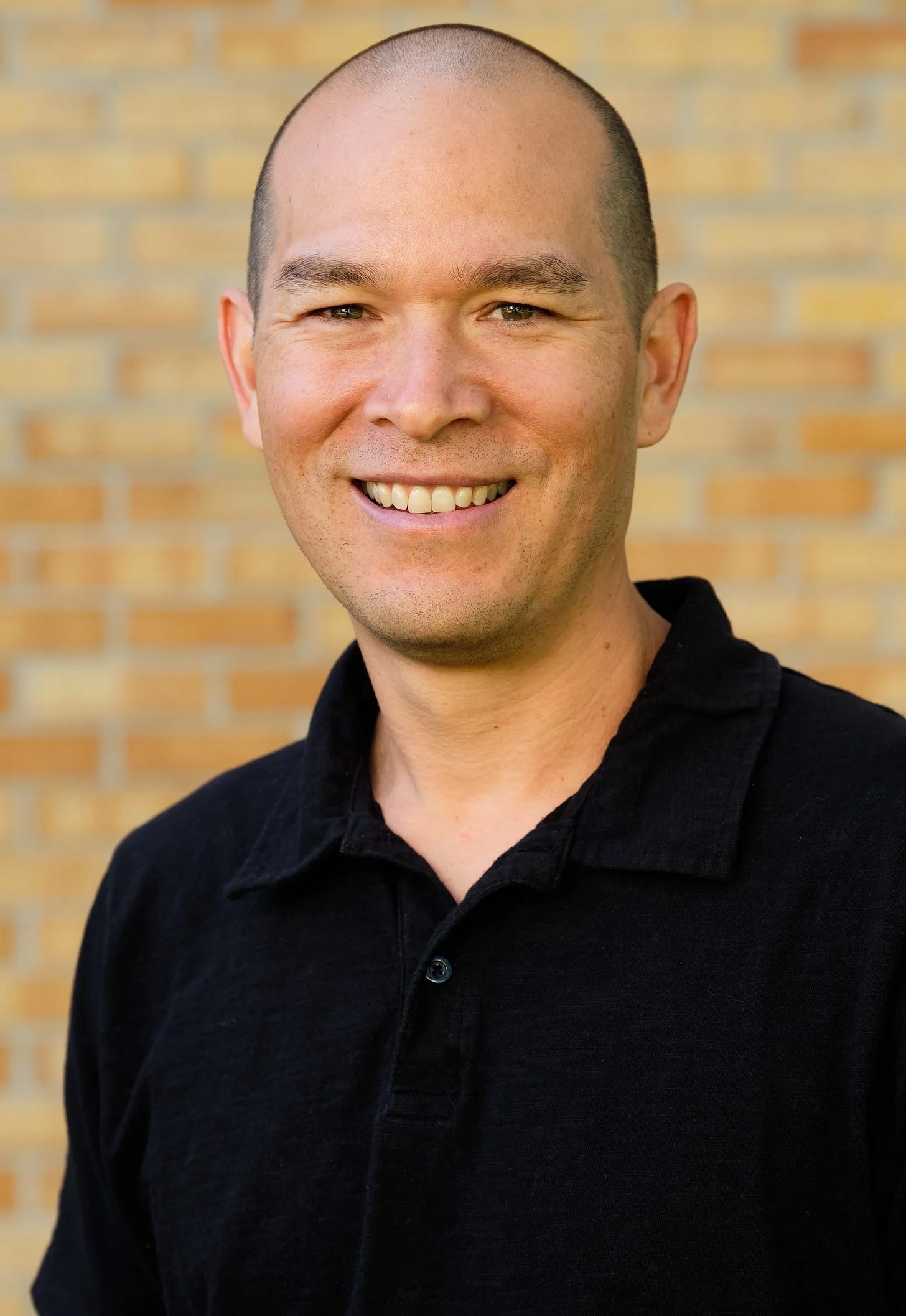“Passion is essential… but I just don’t think it’s sufficient. It’s a piece of the puzzle, but there’s more to the puzzle as well.” — Dr. Mark Aoyagi
If you had met Dr. Mark Aoyagi as a teenager, he would have told you, without hesitation, that sports were his passion. Football, baseball, rugby, wrestling — he lived and breathed them all. Every day was a seamless shuffle between practices, switching between cleats and jerseys like a well-oiled machine. His whole life revolved around one thing: being an athlete.
But passion alone, it turns out, can only take us so far.
By the end of high school, Aoyagi’s body started sending signals that something was wrong. A nagging cough worsened until he was coughing up blood — likely from overtraining without a break between sports. Worse, he had to face the truth: while his heart was fully in sports, his talent wasn’t enough to take him pro.
“I knew that [professional sports] weren’t my future,” he reflects. “There were a lot of signs that were saying, ‘I enjoy this.’ But it’s also time to start thinking about a bigger picture… and what the future is going to hold for me.”
This realization — that passion, while powerful, wasn’t enough on its own — became a turning point in Aoyagi’s life. It guided him toward a new path: the study of how passion intersects with performance.
Today, Aoyagi is a leader in sport and performance psychology, having worked with some of the world’s top athletes — from Olympians to the Los Angeles Dodgers and the Denver Broncos. He’s also the Co-Director of Sport & Performance Psychology at the University of Denver, home to one of the top sports psychology programs in the world. But the journey to this point wasn’t straightforward. Like many athletes facing the end of their athletic careers, Aoyagi struggled to find his footing when his singular focus on sports expanded. He knew there was more to life, but without sports, he felt lost, unsure where to direct the energy and passion that had once consumed him.
It wasn’t until he stumbled into a sports psychology class taught by Dr. Keith Henschen — a legend in the field and, soon after, his mentor — that things began to click. The course revealed something profound to Aoyagi: the mental side of sports, the psychology behind high performance, was just as crucial as physical training. Skills like visualization, confidence-building, and positive self-talk — tools he wished he'd known as an athlete — could be taught, refined, and mastered.
“Holy cow,” he recalls thinking. “I was never taught any of this. I didn’t know these things could be trained. I didn’t know they were skills.”
A part of him wondered whether, with these skills, he might have gone further as an athlete. But an even greater realization took hold: his new passion wasn’t just about improving athletic performance. It was about helping others harness these tools to thrive not just in sports, but in life.
Though Aoyagi and I come from different backgrounds — I didn’t fully come into my own as an athlete until my late twenties, and my study of psychology has all been entirely self-guided — we both arrived at the same conclusion: sport and performance psychology provides life-changing tools. Skills like mindfulness and the ability to focus under pressure have been key to my recent success in jiu-jitsu. But their impact extends beyond the mat, enriching many aspects of life.
Aoyogi echoes this sentiment: “Sports are really just a vehicle for me to use the beautiful science of psychology and the science of high performance to bring more effective, more satisfying, more fulfilling, more meaningful ways of performance to people.”
What I love about sports psychology is its simplicity paired with depth. Take visualization, for example. A common approach is to picture yourself completing a task under perfect conditions. But the "if-then" strategy used by the world’s best athletes goes deeper, preparing you for real-world challenges. You visualize not just ideal outcomes, but also potential obstacles — anything from a flat tire during a race to bad weather. The key is to create a plan for each scenario, so you're mentally prepared to act, not react. This practice applies to anything in life — not just sports. And it’s what makes these skills so universal.
All this ties back to passion because of one main reason: passion alone burns bright but, without structure, short. That’s why Aoyagi teaches that true passion is more than just loving what you do — it requires something deeper to sustain it over time.
When Aoyagi works with rookie athletes, passion is a given. They are there because they love their sport. But early on, he breaks it to them: passion alone isn’t enough. “Passion is essential,” he says. “But I just don’t think it’s sufficient. It’s a piece of the puzzle. But there’s more to the puzzle as well.”
To sustain passion long-term, Aoyagi believes we must root it in our values. The goal isn’t to become someone else but to become the highest expression of who we are — both on and off the field. “A lot of people are taught that when you cross the line or step onto the mat, you become a different person,” he says. “For me, that’s not sustainable. Or it’s some combination of not sustainable and not healthy, right?”
At some point, he insists, that disconnect starts to fracture or break apart. This is why self-awareness and honesty — the ability to reflect on your true values — is so crucial.
“For me, elite performance isn’t just about becoming somebody else,” he says. “It’s about becoming the highest expression of who you are.”
So, how can you do that? Aoyagi emphasizes starting with self-awareness and getting really honest about what drives you: “When you recognize that the reason you love this sport is because it allows you to be aggressive in a way that you can’t in any other realm of life, and you just love aggression… that’s sustainable. That’s connected to you as a person.”
It’s not a value,” Aoyagi insists, “if you can’t do it in other realms of your life.”
In addition to rooting our passions in our values, if we want them to be truly sustainable, we must also connect them to a purpose — something bigger than ourselves. While many of us start out passionate about a sport, hobby, or career simply because we’re drawn to its details and challenges, over time, staying in that self-focused bubble can start to feel limiting. Eventually, we begin to look outward, wanting to share our passion with others. We teach, mentor, or pass on our knowledge to the next generation, giving back to the community that helped shape us.
This shift, Aoyagi explains, is essential for sustaining long-term passion. “It’s recognizing that passion isn’t just a positive feeling that goes up and up forever,” he says. “There’s a dual focus — not only on what we’re getting from it, but also on what we can contribute.”
Connecting our passion to a larger purpose transforms it from a self-focused pursuit into something that benefits others as well. This shift creates a broader sense of meaning that helps sustain passion over time. I’ve experienced this firsthand in jiu-jitsu, where teaching beginners and helping with the kids’ class has brought me a joy that simply working on my personal goals never could.
Finally, passion also demands commitment — a conscious choice to stay the course, even when the thrill wears off. Aoyagi explains, "Feelings come and go. So if you're banking a long-term commitment to something on a feeling, you're in trouble." Too often, people let their motivation rise and fall with their mood. When they’re energized, they go all in, but when they hit a rough patch or lose that initial spark, their dedication fades.
But true passion requires something more. "The average person usually defines motivation as a feeling," Aoyagi says. "I feel like going to practice today. I feel like putting in the work." But true commitment goes beyond that; it’s about taking action, regardless of how you feel.
Aoyagi often reminds his athletes that some days they’ll wake up feeling motivated, but more often, they won’t. The same is true for all of us: “If you follow that feeling, you won't show up very often. But if you follow commitment… you're probably going to show up, be engaged, and get the most out of it."
Ultimately, perhaps, the great power of passion isn’t just in igniting the initial spark, but in inspiring the choice to commit. That commitment then becomes the kindling that keeps the fire burning, pushing you to stay the course, show up, and give your best, long after the spark fades.
Links
Graduate School of Professional Psychology at the University of Denver
Expert Approaches to Sport Psychology: Applied Theories of Performance Excellence






